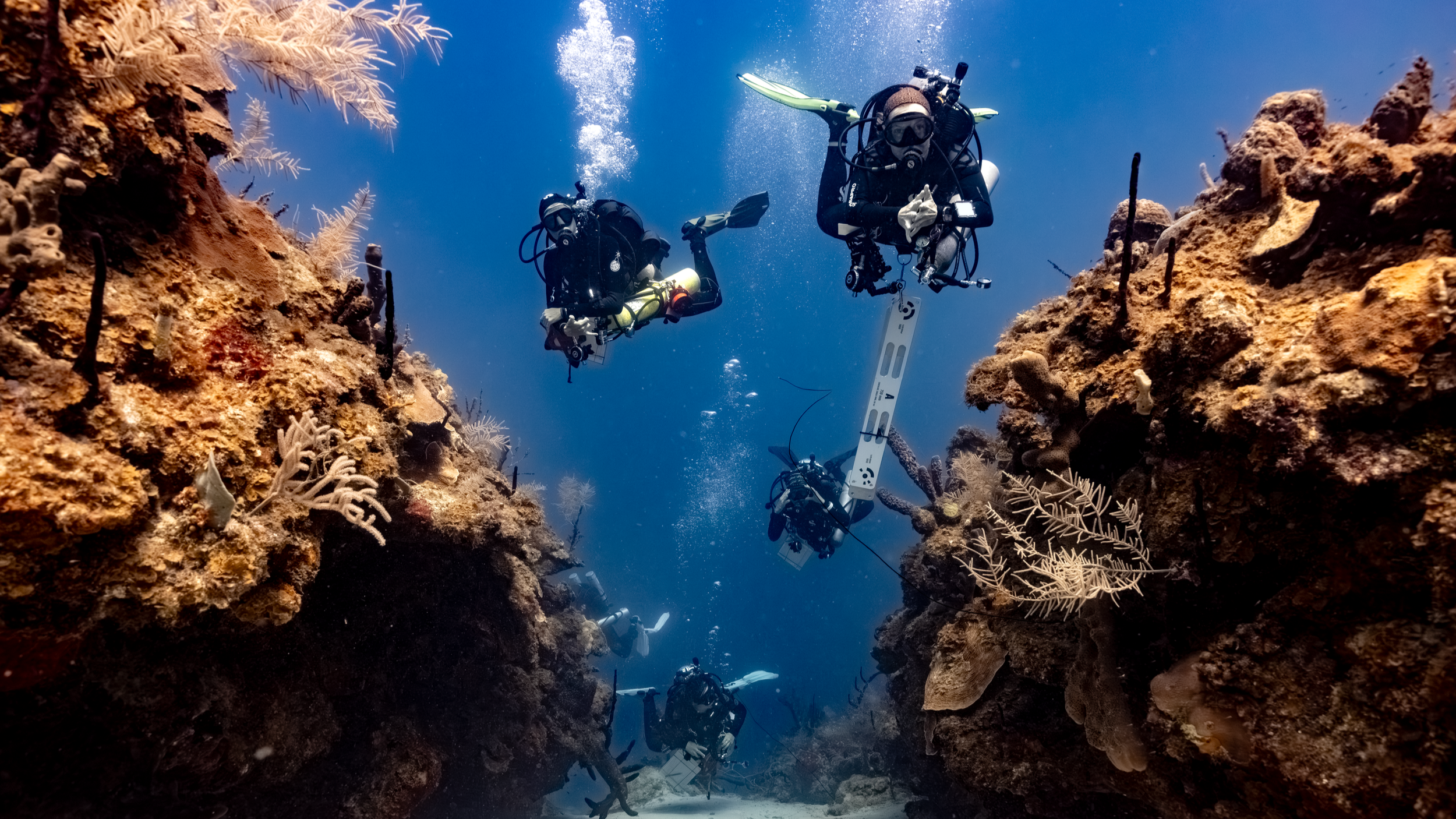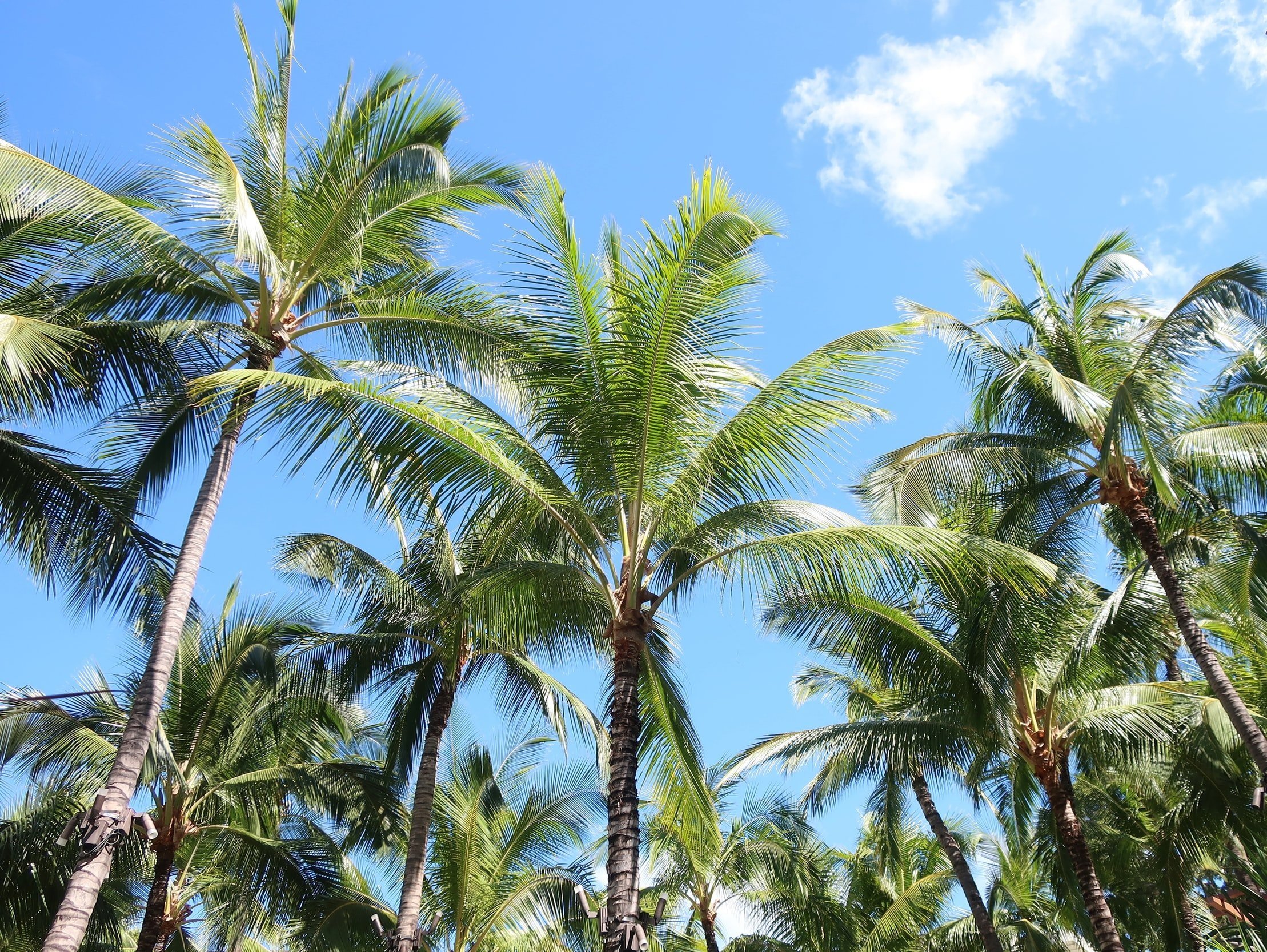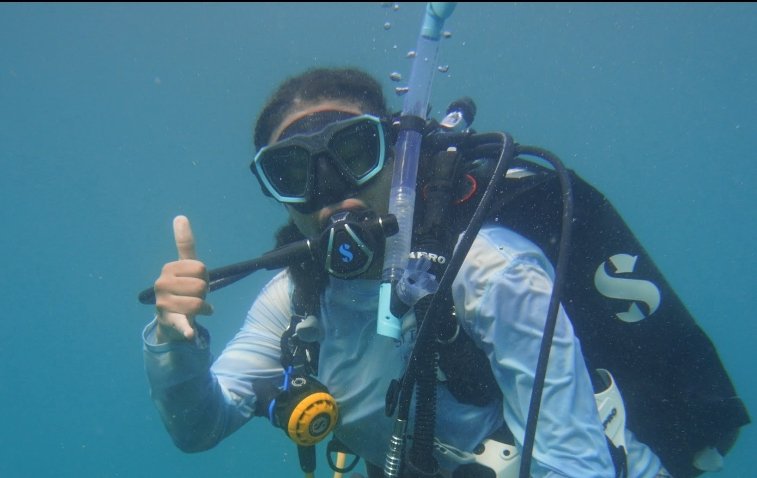
Time to decompress!
Cane Bay Wall, St. Croix, USVI
Photo: Jason Quetel
DO YOU SEE YOURSELF HERE?
LIVE, WORK, STUDY IN THE U.S. VIRGIN ISLANDS!

ABOUT LIFE IN THE USVI
Life in the Virgin Islands is definitely a unique experience. Our islands are beautiful and an immersion into a culturally rich environment. It’s not without its challenges though. The cost of living is higher, we have hurricanes to think about, you definitely ned a car to get around and Amazon is your new best friend.
Section Styles background fullwidth
More About Our Program
THE UNIVERSITY OF
THE VIRGIN ISLANDS (UVI)
Located in the beautiful northeastern Caribbean UVI was founded in 1962 and now has two campuses: one on St. Thomas and one on St. Croix. UVI offers 38 undergraduate degree programs and 7 graduate degree programs including the Masters in Marine and Environmental Science.
Visit UVI for more information.
THE CENTER FOR MARINE AND ENVIRONMENTAL STUDIES (CMES)
Ideally situated for empirical studies of coral reefs and associated tropical marine habitats, CMES is comprised of the MacLean Marine Science Center (MMSC), the Virgin Islands Marine Advisory Service (VIMAS), the Virgin Islands Environmental Resource Station (VIERS), the Environmental Analysis Laboratory (EAL), and the Institute for Geocomputational Analysis and Statistics (GeOCAS).
Dr Smith’s lab is located in the MacLean Marine Science Center, the heart of UVI’s coral reef research efforts.
Visit CMES online.
THE MACLEAN MARINE SCIENCE CENTER (MMSC)
Located on the shore of Brewer’s Bay on UVI’s St. Thomas campus, MMSC supports education and research focused on the ecology and biocomplexity of Caribbean coral reefs. This location provides easy access to a variety of tropical marine environments for faculty, students, and visiting scientists.
The facilities include five research vessels, a brand new state of the art circulating filtered sea water system, an array of field and laboratory equipment, and support for air, Nitrox, and technical Nitrox diving.
Photo credit: Tyler Smith
Photo credit: Sophia McKenzie
THE MASTERS OF MARINE AND ENVIRONMENTAL SCIENCE (MMES)
The MMES Graduate Program provides students with the training and skills necessary for planning, conducting, and evaluating research in marine and environmental science. Additionally, students explore how to utilize research to manage natural resources, with a particular focus on the issues and challenges related to natural resource management in the Caribbean region. The program draws upon the expertise of faculty within several units of UVI, in particular the Center for Marine and Environmental Studies and the College of Science and Mathematics. Further, it is a bridge between academia and natural resource management sectors within the US Virgin Islands, the greater Caribbean, and beyond.
There are two tracks of study in the MMES program: a science based track for those students who wish to focus on research, and a management based track for those students who wish to focus on resource management issues. The program structure allows students to become conversant in the language of both research and resource management, and then to focus on their area of particular interest. Graduates of the program are prepared for a wide array of careers in academic, government, non-profit, and private sectors.
Photo credit: Daniel Mele
Current Students
-

Spencer Parr
Good day! My name is Spencer Parr, and I am a Master’s student in Tyler Smith’s Lab. I was born and raised in St. Thomas, U.S. Virgin Islands but moved up to Washington state after Hurricanes Irma and Maria. I earned my Bachelor of Science degree in Environmental Science with a Marine Emphasis from Western Washington University. At this University, I had the opportunity to study trace elements in snow algae, where I mastered how to use an ICP-MS (Inductively Coupled Plasma Mass Spectrometer). I also was able to work with the University of Victoria, B.C. Canada by monitoring Bull kelp populations within the Puget Sound using ROVs. This undergraduate coursework and research experience have strengthened my understanding of the consequences of climate change and other anthropogenic effects on the marine biome and benthic communities.
Immediately following graduation, I moved back to the Virgin Islands to pursue reef ecology research in the Smith lab. Here I have found interest in bioeroding sponges and their impact on coral reef health and framework. I want to find out what environmental factors have contributed to a sudden increase in bioeroding sponge abundance here in the USVI in the last decade. While I am not in the field, my other loves consist of volleyball, free-diving, hiking, and sailing!
-

Cole Sheeley
National Science Foundation Scholar
Hello! My name is Cole Sheeley, and I am a master’s student in the MMES program and a joint research assistant in the Smith and Glider lab. From a very early age I have been fascinated with the ocean and sea life. Following my passion, I graduated from Roger Williams University in Rhode Island with a bachelor’s degree in marine biology. During my time at the University, I was fortunate to study under Dr. Koty Sharp in her coral lab. After graduation I was accepted at MOTE Marine Laboratory in the Florida Keys as an intern. At MOTE I worked under Dr. Jason Spadaro in the crab lab. I was introduced to the ecology field and studied the connections between grazers along the reef. My experiences at Mote inspired my interest to pursue a career in coral reef conservation and restoration. I am currently working on a project to analyze historical oceanographic data and the thermal variability of the USVI reefs using autonomous underwater gliders.
-

Gillian Coleman
Hey! I’m Gillian and I’m originally from Hurley, MS. I grew up on the Gulf Coast and moved to Baton Rouge in 2020 to get a B.S. in Coastal & Environmental Sciences at Louisiana State University. During my time there I worked in the Seascape Ecology Lab under Drs. Dan Holstein and Ashley Rossin using Histopathology to look at reproduction and disease in corals. I was able to help on several projects associated with the Brandt Lab at UVI, NOAAs AOML, and MOTE Marine Lab. I was also given the opportunity to work on an independent project my last two years looking at the effects of stony coral tissue loss disease on the reproduction of Montastraea cavernosa and was able to present this at Ocean Sciences 2024. My four years of undergrad were full of cool research opportunities and I was recognized as a Distinguished Undergraduate Researcher my senior year.
I moved here to the U.S. Virgin Islands after graduating and plan to pursue research associated with coral reproduction and ecology as a research assistant in the Smith lab!
-

Ally Swan
Hi! I’m Ally Swan a Master’s student in Tyler’s Lab. I’m originally from Clearwater, Florida, where I grew up just five minutes from the ocean. In 2023, I graduated from Florida State University with a Bachelor’s degree in Biology and a minor in Chemistry. During my undergraduate studies, I had the opportunity to delve into marine science research, by conducting a study on a species of sea whip. After graduation, I moved to the Florida Keys and interned at Mote Marine Lab’s coral reproduction lab, focusing on Acroporids affected by the 2023 bleaching event. I later interned with Coral Restoration Foundation in Key Largo, where I contributed to efforts to protect and restore the Florida Reef Tract. These experiences furthered my interest in coral reef conservation and restoration, ultimately leading me to the MMES program at UVI. Here, I plan to research species-specific responses to thermal stress across different depths as a research assistant for the Smith lab!
-

Lila Goodman
Hello! My name is Cheyenne Goodman, but I go by Lila. I graduated from Old Dominion University with a bachelor’s in Biology with a concentration in Marine Biology. During this time, I worked as a Lab Technician at Margaret Mulholland's Phytoplankton Laboratory starting in August 2021. As a lab technician, I identified harmful algae bloom species, cyanobacteria, and phytoplankton prepared samples for analysis, and identified toxins. I also studied sea ice in Alaska for a semester. I was very active in my community, and my undergraduate experience shaped me into wanting to study corals in the Virgin Islands. My graduate research pertains to how damselfish effect coral growth and recovery from thermal stress. I am interested in the impact of climate change revolving around ecological influences on varying organisms. Tyler's lab allows me to have on-hands experience with various tropical corals and their identification. It is a new field from my previous undergraduate studies, but there is always something waiting to be learned!
-

Mädchen Gebhard
Hello everyone! My name is Mädchen (May) Gebhard, and I was born and raised in northern California. I graduated from the University of California, Santa Barbara in 2022 with a B.A. in Environmental Studies and a minor in Earth Science. I knew that I was interested in pursuing a career that focused on ecology and conservation, but I didn’t discover my passion for the ocean until the end of high school when I became a certified scuba diver. In college, I became a divemaster and assisted teaching AAUS training, I interned as a scientific diver in the Santa Barbara Coastal Long Term Ecological Research Laboratory, and I volunteered as a California Reef Check diver, conducting biodiversity surveys and monitoring kelp forest ecosystems. After graduating, I became a PADI instructor and I am also working towards earning my USCG captain’s license! I’ve since been working in the Department of Marine and Coastal Sciences at Rutgers University in New Jersey as a scuba instructor, deckhand, and a volunteer for the Organic Geochemistry Sediment Analysis laboratory, where I’ve sorted sediment cores, identifying planktonic species to understand our climatic history in the oceans. I am beyond excited to join Dr. Tyler Smith’s lab where I will focus on coral reef ecology and the effects of invasive species.
-

Savanna Saunders
Hi! I am Savanna Saunders and I was born and raised in Phoenix, Arizona. I completed my undergraduate degree with a Bachelor of Science in Ecology and Evolutionary Biology with minors in Marine Science, Spanish, and Biochemistry in May of 2025 at the University of Arizona. I have always been drawn to water despite growing up in a desert. Everytime I visited lakes in Michigan and the ocean in California, I was always interested in what was beneath the water. I got involved in the Marine Awareness and Conservation Society at UA where I learned about the vast opportunities in Marine Science and got to teach kids about the ocean. My research at UA involved studying coral response to supplemental light treatment at the Biosphere 2 as well as looking at the kinematics of Cassiopea. Outside of school, I love scuba diving, hiking, watching sunsets, and photography. I am excited to live near the beautiful ocean and expand my coral research and diving skills at UVI and in the Smith Lab!
-

Alexandria Tennant
Hey! I’m Alexandria Tennant, and I’m currently working in Dr. Tyler Smith’s lab. I grew up in Daytona Beach, Florida, where living so close to the water first sparked my love for marine life, though I spent most of my life in Atlanta, Georgia. I completed my undergraduate degree at Savannah State University, where I researched microplastics in the Savannah River through the Toxicology Lab and studied water nutrient dynamics in the Marine Chemistry Lab at the Marine Sciences Research Center. From there, I expanded my research experiences through NOAA, studying heat index trends with the NESDIS office and Rice’s whales with the NMFS office in Miami, Florida. Shortly after graduating, I traveled to Jamaica to research the impacts of anthropogenic disturbances on coral reefs in collaboration with Georgia Aquarium. Each of these opportunities has strengthened my research skills and deepened my understanding of environmental stressors and human activity. It inspired me to focus my research on improving coral reef health and resilience.
Abigail Gretta (2025) Adeline Shelby (2024) Erin Hollander (2024) Liz Harris (2024)
Zachary Gregory (2024)
Nicole Krampitz (2022)
Reagan Mason (2022)
Claudia Carrion Banuchi (2021)
Alexys Long (2021)
Past Students
Naomi Huntley (2020) Joseph Townsend (2019)
Katharine Egan (2018)
Colin Howe (2018)
Tanya Ramseyer (2018)
Alexandra deJarnett (2016)
Sarah Groves (2016)
Katherine Baltzer (2015)
Viktor Brandtneris (2014)
Rosmin Ennis (2014)
Jennifer Kisabeth (2014)
LeAnn Conlon (2013)
Brittney Honisch (2013)
Matthew Kammann (2013)
Robert Brewer (2012)
Christopher Loeffler (2011)
Allan Bright (2009)









